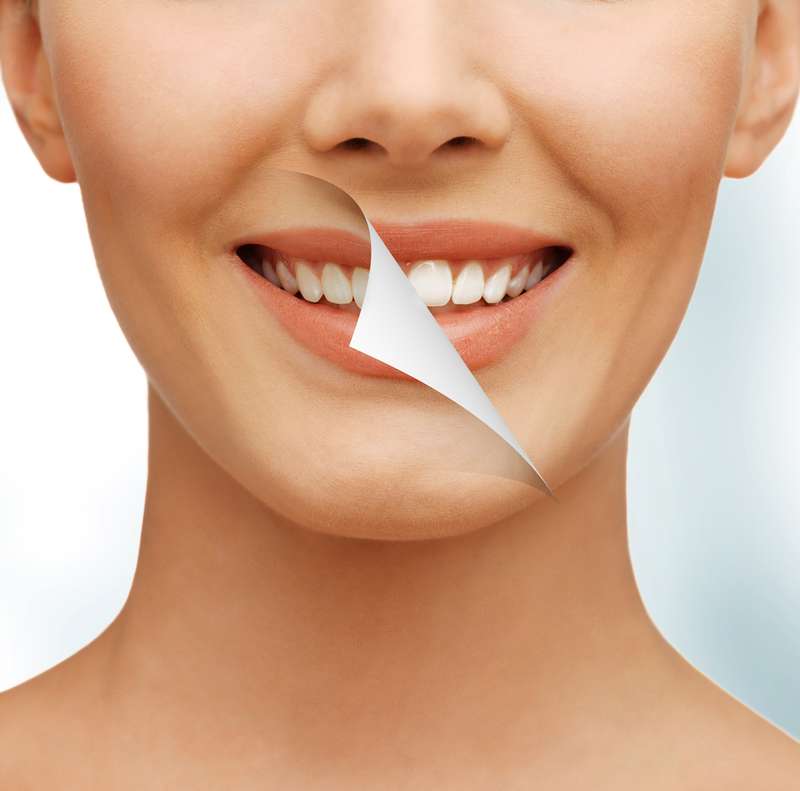Whitening
Teeth whitening
In most cases, the natural colour of teeth is within a range of light greyish-yellow shades. Teeth naturally darken with age and their appearance can be affected by the accumulation of surface stains acquired from the use of tobacco products and the consumption of certain foods or drinks.
In addition, the perception of the colour of teeth is severely affected by skin tone and make-up. Independent of the real colour of their teeth, people with darker skin or who use dark makeup will look like they have brighter teeth.
Although teeth are not naturally meant to be completely white, many Canadians want a brighter smile. Responding to this desire, a wide range of "whitening" options has become available to consumers. These products fall into two main categories: surface whiteners and bleaches.
It should be noted that claims related to tooth whitening are seen as cosmetic in nature by Health Canada. These claims must be accurate, so as not to mislead the public. However, the regulator tolerates some puffery or exaggeration. As a consequence, the results of whitening treatment may not be as convincing as consumers originally expected.
Surface Whiteners
These products use special abrasives to improve the product's ability to remove surface stains. Most products in this category are either toothpastes or chewing gums. Because the special abrasives in these whitening products are often only finer versions of what is used in regular toothpastes, they are unlikely to cause excessive tooth wear. However, the effectiveness of these products is limited to surface stains and should not be used as a substitute for professional cleaning.
Bleaches
Most bleaching products are peroxide-based and are actually capable of altering the colours of the tooth itself. However, not all tooth discolourations respond to tooth-bleaching treatments. Individuals contemplating tooth-bleaching should consult with a dentist to determine the cause of the tooth discolouration and to determine whether a bleaching treatment will have the desired result. This step is especially important for patients with fillings, root canal treatments, crowns and/or with extremely dark stains on the anterior teeth.
A number of different bleaching techniques and products are available to patients. Your dentist will use one of these two methods to whiten your teeth:
- Vital bleaching is done on "living" teeth and can be used to whiten your teeth if they have become stained by food or tobacco, or if they have become dark with age.
- Non-vital bleaching is bleaching done on teeth that are no longer "alive." If your tooth has changed colour because of a root canal, non-vital bleaching can lighten your tooth from the inside out.
There are three methods for bleaching teeth. The method that will work best for you depends on the number of teeth that need to be bleached, and on how badly they are stained (or discoloured).
Your dentist may suggest:
- Putting a special bleach on your stained teeth and using heat (or heat and light) to start the bleaching action; or
- Wearing a custom-made mouthguard filled with a special bleach for part of each day; or
- Brushing with a special bleach mixed in toothpaste.
Bleaching should be done only under a dentist's care. Tooth-bleaching under controlled dental office conditions may be safe and effective, but the new in-office vital tooth-bleaching techniques, particularly those using laser and lights, have undergone little scientific assessment.
Home-use tooth-bleaching systems are available to the general public, either from a dentist or from various retail outlets. Clinical studies support the safety and effectiveness of home-use bleaching gels when used appropriately. Tooth sensitivity and irritation to soft tissues can occur during bleaching treatment, but these effects are transient. Yet the effects of long-term tooth-bleaching are unknown and need to be researched, especially since the effect is not permanent and many individuals end up undergoing periodic bleaching treatments.
